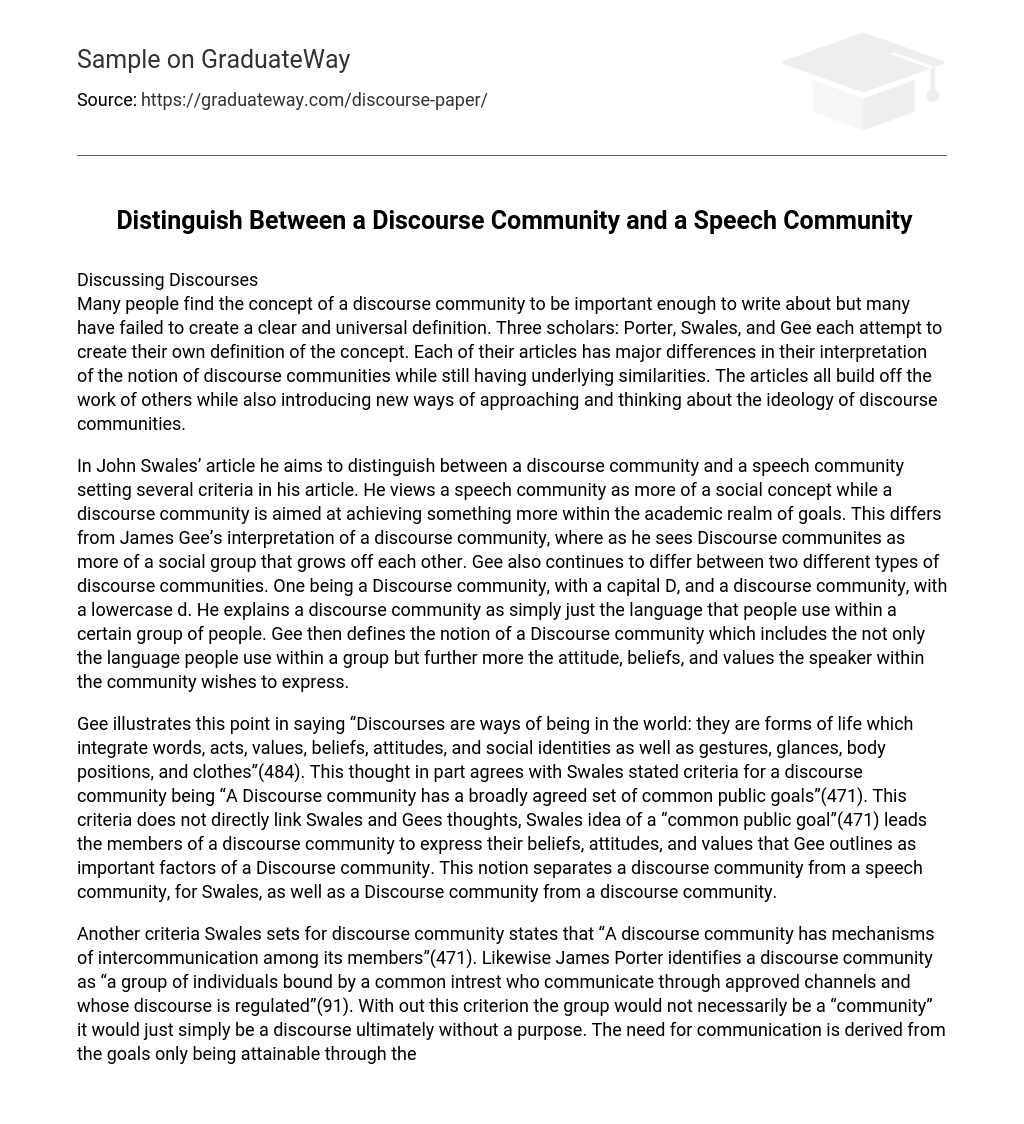Discussing Discourses
Many people find the concept of a discourse community to be important enough to write about but many have failed to create a clear and universal definition. Three scholars: Porter, Swales, and Gee each attempt to create their own definition of the concept. Each of their articles has major differences in their interpretation of the notion of discourse communities while still having underlying similarities. The articles all build off the work of others while also introducing new ways of approaching and thinking about the ideology of discourse communities.
In John Swales’ article he aims to distinguish between a discourse community and a speech community setting several criteria in his article. He views a speech community as more of a social concept while a discourse community is aimed at achieving something more within the academic realm of goals. This differs from James Gee’s interpretation of a discourse community, where as he sees Discourse communites as more of a social group that grows off each other. Gee also continues to differ between two different types of discourse communities. One being a Discourse community, with a capital D, and a discourse community, with a lowercase d. He explains a discourse community as simply just the language that people use within a certain group of people. Gee then defines the notion of a Discourse community which includes the not only the language people use within a group but further more the attitude, beliefs, and values the speaker within the community wishes to express.
Gee illustrates this point in saying “Discourses are ways of being in the world: they are forms of life which integrate words, acts, values, beliefs, attitudes, and social identities as well as gestures, glances, body positions, and clothes”(484). This thought in part agrees with Swales stated criteria for a discourse community being “A Discourse community has a broadly agreed set of common public goals”(471). This criteria does not directly link Swales and Gees thoughts, Swales idea of a “common public goal”(471) leads the members of a discourse community to express their beliefs, attitudes, and values that Gee outlines as important factors of a Discourse community. This notion separates a discourse community from a speech community, for Swales, as well as a Discourse community from a discourse community.
Another criteria Swales sets for discourse community states that “A discourse community has mechanisms of intercommunication among its members”(471). Likewise James Porter identifies a discourse community as “a group of individuals bound by a common intrest who communicate through approved channels and whose discourse is regulated”(91). With out this criterion the group would not necessarily be a “community” it would just simply be a discourse ultimately without a purpose. The need for communication is derived from the goals only being attainable through the use of the community. Swales further more declares the criteria for a discourse to include that the mechanism of communication be used mainly for feedback and to provide information. This allows for members of the discourse to further their expertise as well as a venue to publish or express their ideas and beliefs opening it to criticism. This forum for criticism helps to further develop the ideas and beliefs that are being expressed.
When it comes to the matter of deciding how one becomes a member of a discourse community both Gee and Swales describe different paths. Gee believes that one is born into their primary Discourse and the person is shaped and changed and eventually develops other Discourse based off of how they have grown since their primary Discourse. Gee illustrates this by exclaiming, “aspects and pieces of the primary Discourse become a carrier or foundation for Discourses acquired later in life”(485). Swales on the other hand suggest that one must first share common goals with the discourse and then must start out as a novice within the discourse and will eventually become and expert but can only leave by “death or in other less involuntary ways”(Swales 473).
After the development of the initial primary Discourse, Gee suggest that people naturally develop in to what he refers to as secondary Discourses. This suggest that one can not necessarily choose their Discourses but rather they are “born” into them. This idea conflicts with Swales idea that anyone can join a discourse as long as they share common goals and they new member becomes a novice. Porter agrees with Swales and Gee in that a person may belong to several discourses. They all seem to agree upon the fact that each discourse community is set up in different ways, with varying types of leadership structures and ways of communicating.
Swales criteria goes on to require that “a discourse community has acquired some specific lexis”(473). This requirement set forth by Swales is important in that it helps create separation between a discourse community and a speech community, whereas a speech community may contain certain terms and language they are not community specific due to the speech communities lack of not possessing any goal or form of feedback. Gee seems to believe that any form of special language will be naturally developed as one becomes more and more comfortable within the Discourse community.
Work Cited
Gee, James p. “Literacy, Discourse, and Lingustics:Introduction.”





